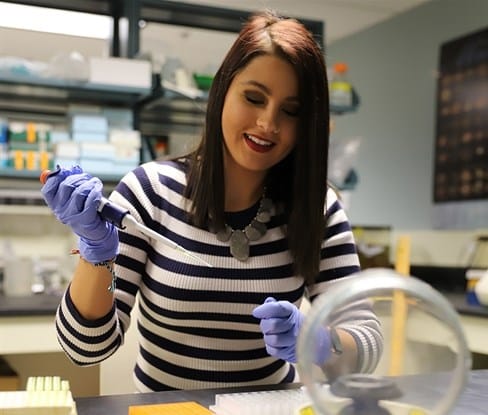
Alyssa Bley may not be your typical scientist. But what is a typical scientist?
“I feel a little insecure at times about science,” Bley said.
And yet, Bley, a Talawanda graduate, came one step closer to achieving her dream of a career as a scientist when she was awarded a Miami University Undergraduate Summer Scholarship in 2019. She conducted research in David Berg’s Aquatic Biodiversity and Conservation Laboratory, which brought opportunities beyond what she could have imagined.
Although Bley always had a love for science and animals, her academic journey started at Butler Tech in the School of the Arts where she pursued Theatre during her junior and senior years of high school. When it was time for her to start thinking about going to college, she turned her focus to science, as a biology major.
She hasn’t looked back since, but the path has not been easy
During the second semester of her first year of college, Bley found out she was pregnant with her son. She finished out the semester and decided to take the following semester off.
“The flexibility of the Regionals helped a lot,” Bley said.”Being able to do online classes helped me get back into the routine of going to school.”
After taking invertebrate zoology with Berg, Bley began working in the ABC Lab and Berg encouraged her to apply for a USS. The highly competitive awards are given to a select group of Miami students based on the quality of their research proposals.
With the assistance of doctoral student Steven Hein, she identified a research topic: determining multiple paternity (the number of males contributing sperm) in broods carried by female mussels. The subject of interest was the Texas hornshell, an endangered species found in the Rio Grande and its tributaries in New Mexico, Texas and northern Mexico.
Male mussels release aggregations of sperm cells into the water, which are filtered by a female and fertilize egg cells to create larval mussels. The larvae are then brooded by the females for several weeks before attaching to fish hosts, where they develop into juveniles before detaching and settling in river sediments to grow to adult size and reproduce.
Research journey takes her to New Mexico
For 20 years, Berg and students in the ABC Lab have collaborated with scientists from the New Mexico Department of Game & Fish to conduct research focused on conservation of the Texas hornshell and other invertebrate species.
As part of her nine-week summer research experience, Bley spent two weeks working in southeastern New Mexico, where she gathered adult and larval samples from the Black River. The rest of her summer was spent utilizing molecular genetic tools in the lab to extract DNA and determine the number of males that fertilized the offspring of individual female mussels.
After completing the research, which is scheduled to continue through the spring of 2020, Bley plans to present it at Miami’s Undergraduate Research Forum and at a national conference. She will then submit a manuscript for publication in a peer-reviewed scientific journal.
The USS opportunity will have taken her through the whole research process: selecting a topic; writing a proposal to fund the research; collaborating with faculty, graduate students and other undergraduates to conduct the research and analyze the data and submitting her results for peer-review, all steps required of a scientist.
“Miami Regionals faculty collaborate with students in disciplinary research in order to provide students the opportunity to develop as scholars in the natural or social sciences, the humanities, fine arts, education or business,” Berg said. “With the USS, Alyssa and other Regionals students have been able to experience the thrill of discovering new knowledge as part of their Miami education.”
Bley, who plans to head to graduate school and study biology or ecology, encourages girls who have a passion for STEM to “just do it.” Find your passion and work toward your dream; you never know where it will take you.
by Emma Price, student communications specialist, Miami Regionals
Please visit https://www.miamioh.edu/news/campus-news/2020/01/alyssa-bley.html to view the original article.
Founded in 1978, the Council on Undergraduate Research (CUR) focuses on providing high-quality and collaborative undergraduate research, scholarly, and creative activity. Among the many activities and networking opportunities that CUR provides, the organization also offers support for the professional growth of faculty and administrators through expert-designed institutes, conferences, and a wide-range of volunteer positions. The CUR community, made up of nearly 700 institutions and 13,000 individuals, continues to provide a platform for discussion and other resources related to mentoring, connecting, and creating relationships centered around undergraduate research. CUR’s advocacy efforts are also a large portion of its work as they strive to strengthen support for undergraduate research. Its continued growth in connections with representatives, private foundations, government agencies, and campuses world-wide provides value to its members and gives voice to undergraduate research. CUR is committed to inclusivity and diversity in all of its activities and our community.
CUR focuses on giving a voice to undergraduate research with learning through doing. It provides connections to a multitude of campuses and government agencies, all while promoting networking and professional growth to its community.


